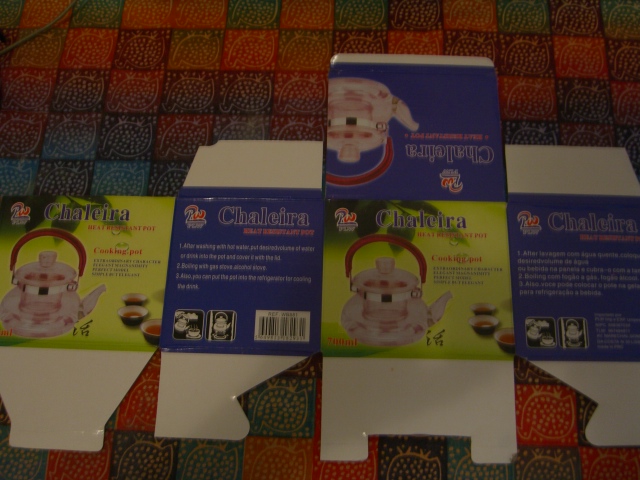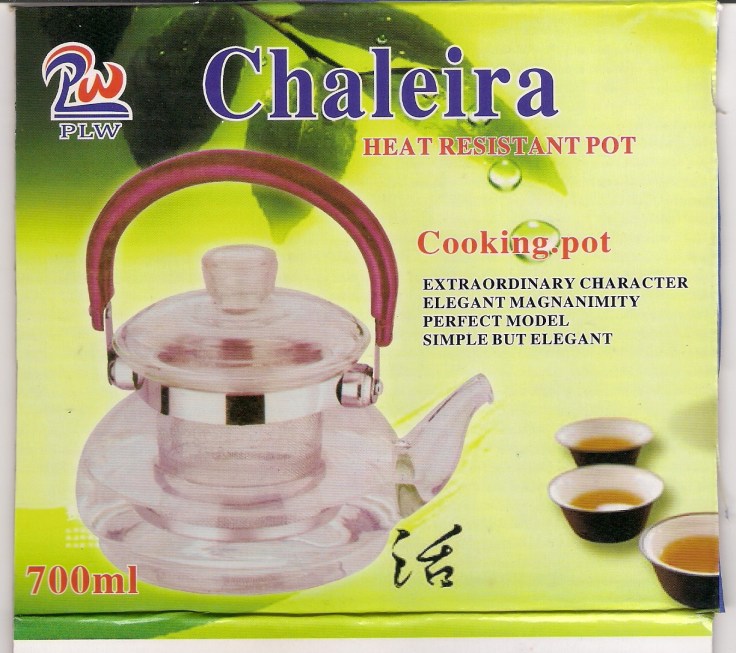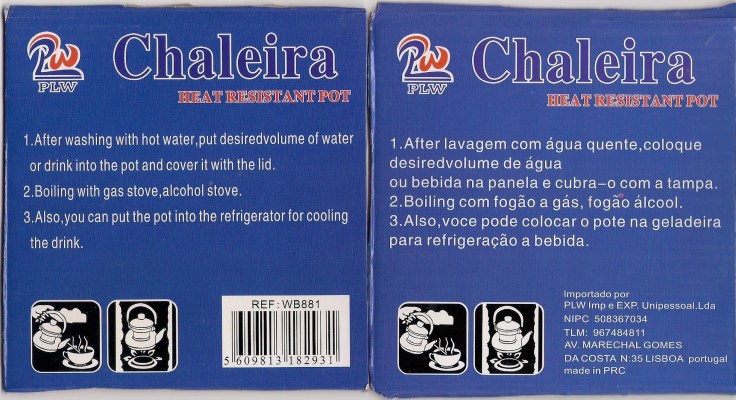How a translator buys a teapot
For health reasons (inflammation of the joints), I have to abstain from artificial sugar, high-acid foods, and coffee. I have been doing so – not 100% successfully – for about three weeks. I have also been drinking litres and litres of water and herbs teas to cleanse my system or to reduce inflammation, depending on the tea. This regime is not new to me; I simply have not followed it for years, so I have accepted the adjustments to my diet as being necessary for a return to good health.
Since I have been a dedicated coffee addict for the five and a half years I have been in Portugal, I did not notice that I do not possess a teapot until three weeks ago. While herb teas now come in bags, there are several herbs which can be picked fresh, for which a teapot is useful. I resolved to get a small one on my next significant shopping trip, which happened this morning.
I found a delightful two-cup tea pot. Made of glass, it has a removable wire-mesh insert into which one’s herbs or tea can be placed for no-mess, no fuss infusion. Perfect! It is aesthetically pleasing and it pours well – a combination not often encountered in teapots. I am happy with my favourably priced purchase.
What I am not happy about is the box it came in. In my world, words on boxes have to make sense. Very few of the words on this box did. I flattened out the box and photographed it for credibility’s sake:

I bought the teapot at “the Chinese shop”. There are many such shops in Portugal because of the long historical association between the latter and China, and in turn, because of the significant tax breaks which businesses owned by those of Chinese origin have (or had, until a few years ago) in Portugal. The information contained in words on the sides with a picture of the article in question caused me immediate confusion: The Portuguese word “chaleira” is the equivalent of “kettle” in English. As I stood there in the shop, I was unsure as to whether it could mean “teapot” as well. I discovered subsequently that it does not.  As I cast my eye over the next few words, my automatic translator cum grammatical terminator shifted into top gear. My thoughts at the time are recorded in brackets:
As I cast my eye over the next few words, my automatic translator cum grammatical terminator shifted into top gear. My thoughts at the time are recorded in brackets:
HEAT RESISTANT (I should hope so)
POT (I shall boil one potato in it, then)
Cooking.pot (Cooking dot pot; f***ing hot cooking dot pot; cooking fat; woman who cooks meat and peas in same cooking dot pot very unhygienic – forget it, not that funny; Who put the red dot there?) So far, I have read four words. My eyes have passed several times between the picture and these four words to try to match them up. I opened the box and examined the item in detail. I decided it was indeed a teapot and that I liked it. I placed the teapot back in the box, and continued reading.
EXTRAORDINARY CHARACTER (Unquestionably)
EXCELLENT MAGNANIMITY (What?)
PERFECT MODEL (Modellansatz [always a conundrum: German for ‘approach’ or ‘model’, depending on the context, but seldom ‘approach model’ or ‘model approach’, whatever that means]; Grace Jones {I’m not perfect but I am perfect for you – I bet you are!})
SIMPLE BUT ELEGANT (Finally something I can understand)
I read these four lines again, and juggle them about, just for fun: An EXCELLENT CHARACTER of EXTRAORDINARY MAGNANIMITY keen to PERFECT a SIMPLE BUT ELEGANT MODEL.
I jerked myself back into reality, and turn the box to find myself reading “Portuguese”:

- At this point, my mind explodes with the flood of reactions, the two principal ones being: Lovely! The (non-native Portuguese) pseudo-translator’s time was up on the deadline, so he or she just sent the document to the client unfinished. Nice one!
- When will people realise that different languages have different structures? You cannot transpose the structure from one language to another! By structures I mean primariIy conventional grammatically correct constructions, but also something slightly more nebulous which has to do with phraseology and revolves around the manner in which another language conceptualises things and how that differs from your own. I stopped my internal rant, for I realise that dredging up indignation is not constructive; I have no wish to sound like a language teacher who has permanently lost her patience.
I balked at the omission of the circumflex on ‘você’, and wondered why freezing tea in this teapot –which is also a kettle but is called a pot and a pan and a jug – would be a selling point. When I got home, I highlighted all the ghastly bits I noticed:

I am not going to criticise the language use in English. It was clearly written by a non-native, possibly of Chinese extraction. Whatever the linguistic heritage of the writer, his or her mother tongue has strongly influenced this text. Suffice to say that rinsing is what we do with water. Washing generally requires soap and water, although there are many instances where soap is not part of the washing equation.
I am not going to criticise what little Portuguese there is in the Portuguese text because I am not proficient enough in the language to do so, and make similar mistakes myself – minus the wholesale transplantation of English words as is the case here.
What I will berate is the fact that this company who has endorsed these unfortunate texts by “signing their name” on this packaging does not seem to know that such people as copywriters and translators exist, i.e. professionals who specialise in performing these tasks. Either that, or the company is aware of our existence but, in the interests of saving money, decided to do the job itself, fully expecting that no one would notice.
I also have a sense of horror that non-translators who possess even basic competence in either or both of the languages on this packaging may immediately assume that it is “the translator” who has done a poor job, and wonder why anyone would pay good money for such garbage.
This assumption may lead them to decide to “do the job themselves” should they ever have the need for a translation, thus adding even more detritus to the great translation garbage patch and making it so much harder to achieve the ‘desiredvolume’ of such garbage which oils the wheels of commerce: zero.
Allison
P.S. At least I now know that there is such a thing as an “alcohol stove”. I suppose there are some people who would take this nifty kettle and teapot combo with them on a camping trip.

You are funny when you are indignant.
Missed hanging uot here.
I’m still laughing from your inicial red letter reactions.
LikeLike
I love this post! Still laughing 🙂
LikeLike
Now I am laughing, because I use the pot every day, but had forgotten that I had even written this article until I visited this post again today. A possible case of “excellent magnanimity”, perhaps.
LikeLike